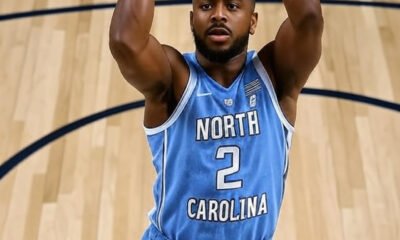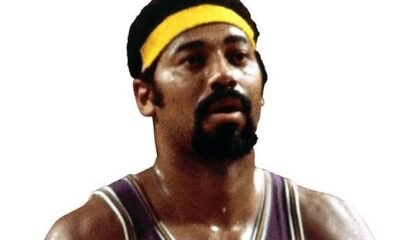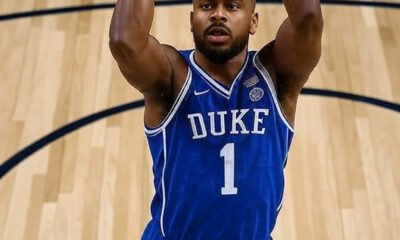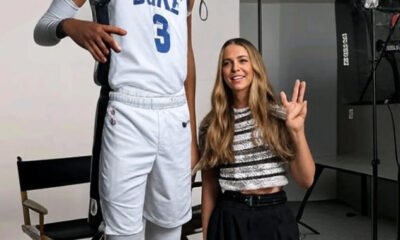Blog
Black Female College Softball Player Makes History as the First to Sign a $1M Deal with Oklahoma Sooners
Trailblazing Achievement: Black Female College Softball Player Becomes First to Sign $1 Million Deal with Oklahoma Sooners
In a historic milestone for college sports and gender equity, Jasmine Carter, a senior star athlete at the University of Oklahoma, has signed a groundbreaking $1 million endorsement deal with the Oklahoma Sooners, making her the first Black female college softball player to secure such a lucrative contract. This momentous event not only underscores her exceptional talent on the field but also signifies a broader shift toward inclusivity and recognition for women athletes, especially women of color, in collegiate sports.
### The Rise of Jasmine Carter
Jasmine Carter, a 21-year-old outfielder from Houston, Texas, has been a standout player since her freshman year. Known for her blazing speed, powerful bat, and exceptional defensive skills, Carter has led the Sooners to multiple conference titles and national tournament appearances. Her athletic prowess combined with her charismatic leadership qualities has made her a fan favorite and a role model for young girls across the nation.
Carter’s journey to this historic deal has been marked by perseverance and dedication. Coming from a modest background, she faced numerous challenges growing up, including limited resources and access to elite training. Her determination, however, propelled her through high school softball dominance, earning her a scholarship to Oklahoma and a reputation as one of the top prospects in the country.
### The Significance of the Deal
While endorsement deals for college athletes have become more common in recent years, especially with the NCAA’s Name, Image, and Likeness (NIL) policy introduced in 2021, a $1 million pact is unprecedented, particularly for a college softball player. This deal with the Oklahoma Sooners, the university’s official merchandise and apparel partner, is not only a testament to Carter’s influence but also a reflection of the sport’s growing popularity and commercial viability.
The deal reportedly includes a combination of endorsement payments, merchandise sales, and social media promotion, positioning Carter as a brand ambassador for Oklahoma softball and women’s sports at large. It is expected to inspire future generations of athletes and challenge the longstanding disparities in sports endorsements, which have historically favored male athletes and athletes in high-profile sports like football and basketball.
### Breaking Barriers for Women and Women of Color
Carter’s historic signing is a significant step forward in addressing gender and racial disparities in sports endorsement opportunities. Historically, Black women athletes have faced systemic barriers, including limited media coverage, fewer sponsorship deals, and societal stereotypes that undermine their achievements.
By securing such a high-profile deal, Carter shatters stereotypes and paves the way for increased visibility of Black female athletes in collegiate and professional sports. Her success highlights the importance of diversity and inclusion in sports marketing and endorsement landscapes, encouraging brands and organizations to recognize and invest in talented women athletes regardless of race or sport.
### The Role of NIL and Changing Landscape
The NCAA’s NIL policy has radically transformed college athletics, allowing athletes to monetize their fame and talents legally. While this has created new opportunities, it has also sparked debates about fairness, commercialization, and the amateur status of college athletes.
Carter’s deal exemplifies how NIL can be a game-changer for athletes from underrepresented backgrounds. Her ability to leverage her athletic success into a lucrative endorsement indicates a positive shift toward recognizing the value of women athletes and athletes of color in the marketplace.
### Community and Cultural Impact
Beyond the financial achievement, Carter’s deal has cultural and societal implications. As a Black woman excelling in a sport that historically has struggled for mainstream recognition, her success amplifies the narrative of diversity in sports. It also encourages young girls of all backgrounds to pursue their athletic dreams without fear of societal limitations.
Moreover, her prominence offers an opportunity to promote conversations about equity in sports, the importance of representation, and the need for systemic changes that support women athletes, especially those from marginalized communities.
### The Future for Jasmine Carter and Women’s Softball
Jasmine Carter’s historic endorsement is expected to open doors for more women athletes to secure substantial endorsement deals. It sets a precedent that talent, dedication, and marketability can lead to financial opportunities regardless of gender or race.
For Carter personally, the deal provides a platform to advocate for causes she cares about, including youth sports development, education, and racial justice. She has expressed her commitment to inspiring the next generation and using her influence to promote positive change.
In the broader context, her achievement underscores the rising prominence of women’s sports, which is experiencing record viewership, increased sponsorship, and media coverage. As the sport of softball continues to grow in popularity, particularly with the success of the U.S. Women’s National Team and increased college competitions, more athletes like Carter are poised to become household names.
### Reactions and Celebrations
The response from the sports community, fans, and advocacy groups has been overwhelmingly positive. Oklahoma Head Coach Patty Gasso praised Carter’s leadership and impact, stating, “Jasmine embodies everything we want our athletes to be — talented, driven, and trailblazing. Her signing is a historic moment for women’s softball and college sports as a whole.”
Meanwhile, advocacy organizations dedicated to promoting gender equity in sports have highlighted Carter’s achievement as a breakthrough moment. Dr. Lisa Mitchell, director of Women in Sports Equity, commented, “This deal exemplifies how far we’ve come and how much further we need to go. Jasmine’s success will inspire systemic change and greater investment in women’s sports.”
### Challenges Ahead
Despite the positive momentum, challenges remain. The sports industry continues to grapple with issues of funding disparities, media coverage imbalance, and societal stereotypes that limit opportunities for women athletes. Carter’s story is a beacon of progress, but it also underscores the need for sustained efforts to ensure equity and inclusion.
Additionally, as more athletes leverage NIL opportunities, questions about commercialization, amateurism, and the long-term impact on college sports are likely to persist. Stakeholders must work together to develop policies that protect athletes’ rights while promoting fair competition and representation.
### Conclusion
Jasmine Carter’s historic $1 million endorsement deal with the Oklahoma Sooners marks a watershed moment in college sports history. As the first Black female college softball player to reach such a milestone, she has not only elevated her own career but also challenged societal norms and opened doors for future generations of women athletes.
Her achievement reflects changing attitudes toward women’s sports, the power of NIL policies, and the importance of diversity and inclusion. As Carter continues to excel on the field and serve as a role model off it, her story will undoubtedly inspire continued progress toward equality and recognition for women and women of color in sports.
In a broader sense, this breakthrough signifies hope and possibility — a reminder that talent, perseverance, and advocacy can transform industries, challenge stereotypes, and create a more equitable future for all athletes.
-

 Arsenal2 years ago
Arsenal2 years agoSad News Arsenal ex player who is goal scorer confirmed dead this morning
-

 Liverpool2 years ago
Liverpool2 years agoSad News Sadio Manè Confirmed Dead Today By Sky Sports Reporters, Open For Full Story 👇
-

 Blog1 year ago
Blog1 year ago“I was forcefully removed from Manchester United squad and now I’ve joined the best team in the world…I will revenge and as a result, I’ve ordered my friend who’s their best player currently to leave there with immediate effect and he has agreed”: Former Man United player angered by United decision to removed him from the squad as he ordered the Club’s best player to leave immediately.
-

 Blog1 year ago
Blog1 year agoSad News: Manchester United player died when playing for his country England yesterday 😢 😔
-

 Blog2 years ago
Blog2 years agoR.I.P: Formal Real Madrid and France international confirm death this morning
-

 Chelsea2 years ago
Chelsea2 years agoBreaking New:”Roman Abramovich could get Chelsea back”? Chelsea owner review the conversation between him and Roman Abramovich in. Deal about getting Chelsea back
-

 Blog2 years ago
Blog2 years agoUNBELIEVABLE: Manchester City midfielder KELVIN DE BRUYNE divorced wife this morning after DNA test revealed their 5 years old son belongs to formal Manchester United player
-
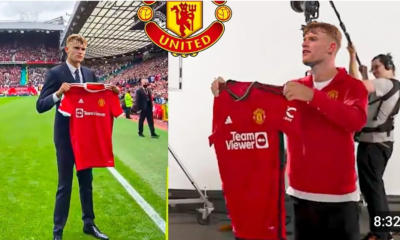
 Manchester United1 year ago
Manchester United1 year agoOFFICIAL NOW: Manchester United announce the signing of 23yr sensational player after beating Liverpool and Madrid for His signature, agreement reached on a 5yr deal, Medical completed – announcement ongoing



